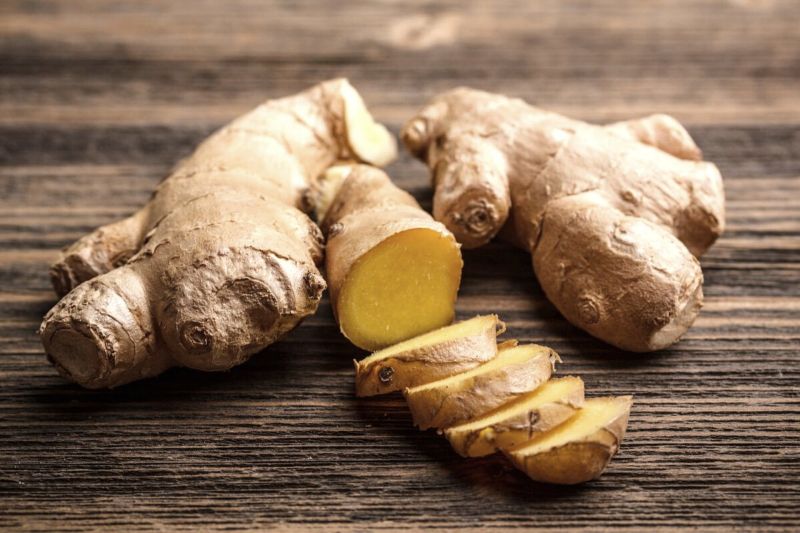What is ginger root good for?
Ginger root, or rather ginger rhizome, is taken from the Zingiber officinale plant, a perennial flowering plant that belongs to the same family as turmeric and cardamom.
It is native to South-East Asia, and has been used in traditional Chinese medicine and Ayurvedic medicine for millennia. Ginger was one of the first spices to arrive in Europe via the spice trade, and was used by ancient Greeks and Romans.
While we generally use ginger, either in fresh or powdered form, for bringing extra flavour to our cooking and assisting with the digestive process, the emergence of ginger root supplements in recent years seeks to take full advantage of the potent health benefits of these rhizomes in concentrated form.
Specifically, ginger and its gingerol compounds exhibit anti-inflammatory, antibacterial, and antiviral properties, and are packed with antioxidants.
The combination of these compounds show promising potential for helping to prevent or treat a wide array of health conditions that are associated with inflammation and infection, including diabetes, cancer and arthritis.

Ginger root for inflammation
For example, a 2015 review found that ginger supplementation is efficient for treating inflammation associated with osteoarthritis, while a later review of 16 clinical trials concluded that compounds in ginger actively combat inflammation, and that ginger also helps reduce pain and increase mobility.
Participants in these trials took between 0.5g and 1g of ginger daily, on timeframes ranging from 3 to 12 weeks.
Ginger root for digestive health
While we are familiar with ginger's role in aiding digestion, research shows that the specific reason for this property seems to be the enzymes in ginger that help break down and disperse gases that are produced during the digestive process, providing relief from the bloating and discomfort usually associated with gas buildup.
Ginger is also known to facilitate the digestive process overall, increasing movement through the digestive tract, and potentially reducing the risk of constipation.
Furthermore, ginger also appears to assist other enzymes in carrying out their duties, such as pancreatic lipase, which carries out digestion in the small intestine.
But wait, it gets better. Recent research suggests that ginger may even be effective against certain types of cancers that occur within the gastrointestinal tract, including gastric cancer, colorectal cancer, pancreatic cancer, and also liver cancer.
Ginger root for nausea
Ginger's ability to improve digestion is also related to another of its well-known properties, that is the ability to reduce nausea. Studies show that it also has the potential to help alleviate morning sickness, as well as feelings of nausea for people that are undergoing chemotherapy, although further research is required in this field.
It is thought that it is the aromatic compounds in ginger, such as gingerol, are what help reduce feelings of nausea.
Ginger root for the immune system
Ginger tea, perhaps mixed with lemon and/or honey, is often taken as a home remedy for the flu and common cold.
Research seems to support this, showing that daily ginger consumption is able to reinforce the immune system and support recovery from respiratory illness, although studies show that these beneficial effects seem to be weakened for smokers, when compared to non-smokers.
Ginger root for diabetes and cardiovascular health
One study performing in 2017 that involved over 4,600 people found that by consuming ginger on a daily basis, participants were able to reduce the risk of developing heart disease, high blood pressure, strokes, diabetes and fatty liver disease, and one animal study in 2016 found that ginger extract was able to reduce the risk of developing heart abnormalities in rats that were suffering from diabetes.
When should I take ginger root?
Ginger root supplements can generally be taken at any time of day, with or without food, however you may want to consider taking them with a meal in order to take full advantage of their digestive benefits.
Also, some people prefer to incorporate ginger into their morning routine for its invigorating effects, while others enjoy taking advantage of ginger's relaxing properties in the evening, so the time of day at which you take ginger supplements is pretty much a matter of personal preference, and through trial and error you will be able to see which method sits best with your daily routine.
You can of course also choose to incorporate ginger root supplements with all of your meals.
What does ginger root combine well with?
Ginger root with curcumin, for inflammation
Research has shown that curcumin and ginger exhibit an additive effect when they are combined, particularly when it comes to reducing inflammation. This is thought to be due to the fact that ginger belongs to the same family as turmeric, and shares many of the same anti-inflammatory and antioxidant properties.
Ginger Root data sources & further reading
Last updated by Asklepios on 1st February, 2025